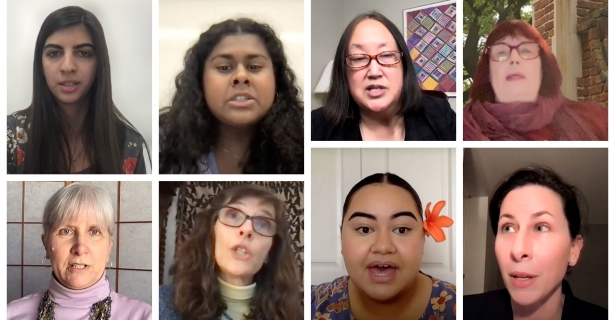Tufts Women In International Relations hosted their first Spring Conference on March 11-12. The conference consisted of three panels: Gender x Economics, Gender-Based Violence, and Gender and Climate, and was attended by panelists Joyce Jacobsen, Drucilla Barker, Julie Nelson, Cecilia Ananíasl, Wairimu Munyinyi-Wahome, Brianna Frueran, Stephanie Buechler, and Jennifer Telesca.
The first panel on Friday, March 11th, was Gender x Economics, moderated by Sejal Mayer-Patel. Economists Joyce Jacobsen, Drucilla Barker, and Julie Nelson discussed why they entered the field, how gender impacts the economy, and what their obstacles have been throughout their careers. Interestingly, all three women became interested in economics to understand why inequality exists and to gain autonomy in their careers. By the end of the hour, it was clear that, due to a lack of change in job structure and failure to support and acknowledge the care economy appropriately, there are significant gender inequalities in domestic and international economies. As Julie Nelson mentioned, the employment structure is set up as jobs with wives. In other words, the workplace model was created with the assumption that there is a primary household caretaker in charge of all other obligations aside from the workplace. This caregiver bias affects employees on all levels and is evident by the disproportionate amount of women who were unable to return to work after the initial effects of the covid-19 pandemic. The three panelists also touched on the global workforce inequalities and emphasized the lack of intersectional voices in the economist world, which contributes to the perpetual cycle of inequality.
The next morning, Ashley Flores-Jones, moderated as Cecilia Ananíasl and Wairimu Munyinyi-Wahome, spoke to the audience about gender-based violence, female genital mutilation, obstacles preventing safer environments, and what steps can be taken to decrease the violence. Ananíasl and Munyinyi-Wahome were speaking from Chile and Kenya, respectively and their perspectives on non-American environments broadened the audience’s perspective immensely. Both women illustrated the harrowing effects of femicide, incomplete abortion laws, and Munyinyi-Wahome led the explanation on what female genital mutilation is and its effects on the community and the women. After speaking about numerous obstacles, including the care economy that was defined in the Gender x Economics panel. When asked how to combat gender-based violence, the women emphasized that this is not an individual problem but a society problem. As Ananíasl stated, we cannot have effective policy change until we can confront the norms, attitudes, and beliefs within our family and community.
The final panel, moderated by Selomi Dayapura, was at 5 pm on March 12th with panelists Brianna Frueran, Stephanie Buechler, and Jennifer Telesca covering the implications of climate change, the effects of a male-dominated space, and steps individuals can take against the crisis. Telesca spoke about the importance of science at the interface of the climate crisis and climate policy and how a fundamental obstacle is the lack of representation of women in these discussions. After speaking about their own experiences in the field and the importance of creating a bigger space for women, the women ended with the reminder that the change they are fighting for is possible. As Frueran eloquently said, for a long time people thought the world couldn’t stop, and then it did [due to the pandemic]. Now that we see the world can come to a halt, it is realistic to believe that effective cooperation between states can occur against the climate crisis.
Although the panels focused on three different issues, all the panelists spoke about the role of intersectionality and the importance of education and advocacy for each issue. It was inspiring to hear each woman speak about their journeys against discrimination and towards change in each field. Tufts Women In International Relations would like to thank the panelists once again for taking the time to be a part of the conference, especially Munyinyi-Wahome, Nelson, and Frueran, who spoke at odd times due to time zone differences to be at our panels. If anyone is interested in hearing more from these panelists, each panel was recorded, and we urge those who were unable to attend to take the time to watch.

